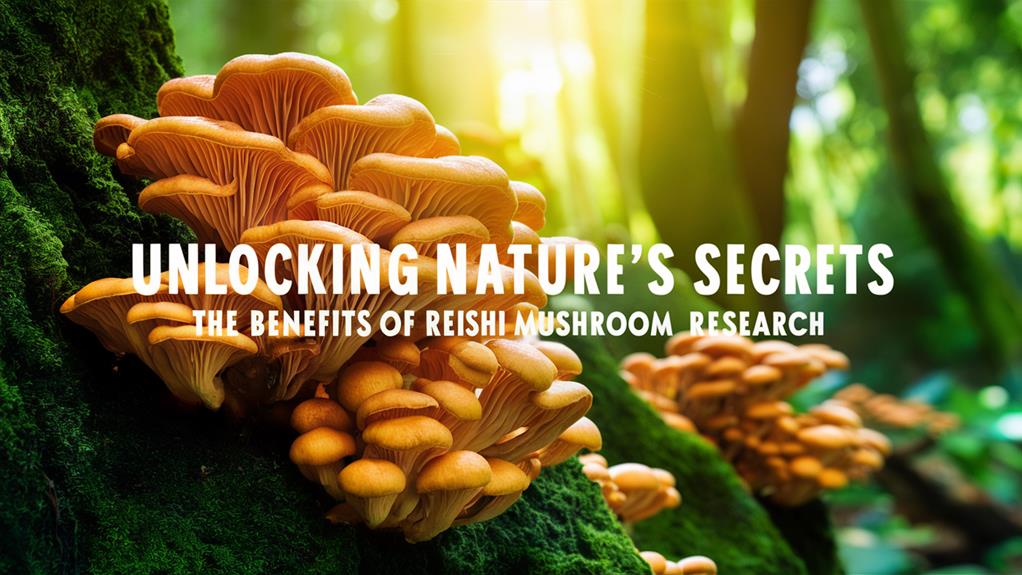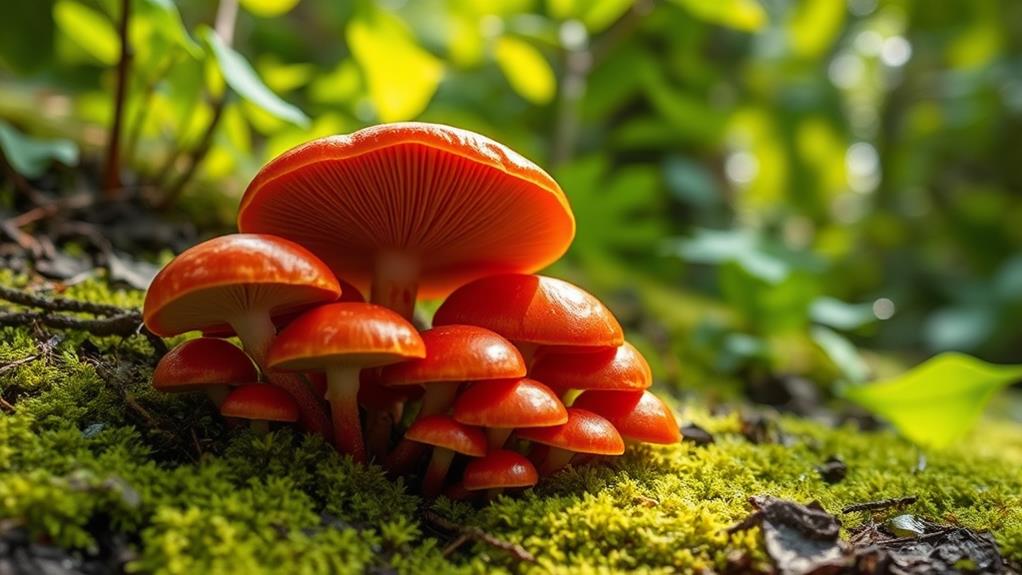
Studies on reishi mushroom highlight its impressive health benefits. You'll find that it boosts immune function, helping your body fight infections and even cancer. Research shows it enhances white blood cell activity, important for combating illness. Reishi also contains compounds that may lower blood sugar and alleviate fatigue, making it a promising option for diabetes management and chronic fatigue. Additionally, some studies suggest it could improve mood and reduce anxiety. If you're considering incorporating reishi into your routine, understanding proper dosages and safety precautions is crucial, and there's even more to explore about this fascinating mushroom.
Historical Background of Reishi

Have you ever wondered why the reishi mushroom, or Ganoderma lucidum, has held such a revered place in traditional Chinese medicine for over 2,000 years? This medicinal mushroom, often called "the mushroom of immortality," was documented in ancient texts, including the Shen Nong Ben Cao Jing, which emphasized its therapeutic properties.
Historically, wild reishi was rare and primarily accessible to nobility, boosting its reputation as a powerful panacea in ancient cultures. Its status as a luxury item due to rarity further enhanced its cultural significance and importance in traditional rituals aimed at achieving balance and well-being.
In various Asian cultures, reishi was associated with health, longevity, and spiritual potency. People believed that consuming this mushroom could enhance their well-being and even extend their lives.
Its importance in traditional Chinese medicine can't be overstated, as it was often used to promote healing and balance.
Today, modern scientific research is starting to validate these ancient claims. Studies are uncovering G. lucidum's health benefits, particularly its ability to modulate the immune system and potentially assist in managing chronic diseases.
This blend of historical significance and emerging scientific evidence showcases reishi's lasting legacy as a remarkable natural remedy, bridging ancient wisdom and contemporary health practices.
Key Bioactive Compounds
When you think about the health benefits of reishi mushrooms, it's important to consider their key bioactive compounds, like polysaccharides and triterpenes.
These compounds play a major role in boosting your immune system and may even help manage glucose levels.
Research indicates that these bioactive compounds also enhance white blood cell activity, which is essential for fighting infections.
Understanding how they work can help you appreciate why reishi mushrooms are valued in traditional and modern medicine.
Polysaccharides and Health Effects
Polysaccharides, especially beta-glucans found in Reishi mushrooms, play a crucial role in promoting health and wellness. These powerful compounds enhance your immune response by boosting the activity of white blood cells, helping your body fight off infections more effectively.
Studies on Ganoderma lucidum, the scientific name for Reishi mushrooms, show that polysaccharides can also help regulate blood sugar levels. This means they may improve insulin sensitivity, which is particularly beneficial for individuals with diabetes.
Additionally, their anti-cancer effects have been highlighted in research, demonstrating their potential to inhibit tumor growth and enhance the efficacy of conventional cancer treatments.
Moreover, the anti-tumor properties of Reishi polysaccharides have been documented in various research studies. They may inhibit tumor growth and even enhance the results of conventional cancer treatments.
Additionally, polysaccharides exhibit significant antioxidant activity, protecting your cells from oxidative stress and reducing the risk of chronic diseases.
Clinical trials have suggested that these compounds can alleviate symptoms of chronic fatigue, making it easier for you to enhance your overall quality of life.
Triterpenes and Immune Support
Reishi mushrooms aren't just packed with polysaccharides; they also contain another key group of bioactive compounds known as triterpenes. These triterpenes play a vital role in immune support, offering anti-inflammatory and immune-modulating properties.
When you consume Reishi, you're tapping into the power of Ganoderma lucidum, which can enhance the activity of your immune cells.
Research shows that triterpenes can stimulate natural killer (NK) cells, essential for defending your body against tumors and infections. They also boost the production of cytokines, the signaling molecules that help coordinate your immune response.
For instance, studies involving patients with colorectal cancer revealed that those who supplemented with Reishi experienced increased white blood cell counts. This suggests that triterpenes may help boost immune function.
Additionally, triterpenes have been linked to the inhibition of lymphocyte suppression, a crucial factor during cancer treatments. By supporting immune health in this way, triterpenes contribute significantly to your overall wellness.
Immune System Enhancement

Among the many natural supplements available, reishi mushroom (Ganoderma lucidum) stands out for its impressive ability to enhance immune function. When you incorporate reishi mushroom into your routine, you could boost your immune system significantly.
Research shows that reishi increases the activity and count of white blood cells, which are essential for fighting off infections. A study conducted in 2006 found that colorectal cancer patients who took reishi supplements saw an increase in their white blood cell counts, suggesting it may help immunocompromised individuals.
Moreover, polysaccharides found in reishi can stimulate lymphocytes, enhancing your immune response. In clinical trials, patients using reishi alongside traditional cancer therapies reported improved quality of life and less fatigue, indicating its supportive role in immune health during treatment.
Additionally, studies have shown that reishi extracts can bolster natural killer (NK) cell activity, crucial for eliminating tumor cells and virus-infected cells. By considering reishi mushroom, you can take a step towards better immune health, making it a valuable addition to your wellness journey.
Anti-Cancer Research
The potential of reishi mushroom in cancer research is gaining significant attention due to its promising properties. Known scientifically as Ganoderma lucidum, this mushroom shows great promise in fighting cancer.
Studies indicate that polysaccharides found in reishi mushroom may inhibit tumor growth and even induce apoptosis, or cell death, in cancer cells, particularly in prostate and colorectal cancers.
Research has also revealed that Ganoderma lucidum can enhance the effectiveness of chemotherapy. For example, it may increase the sensitivity of ovarian cancer cells to cisplatin, a common chemotherapy drug. This means that patients undergoing treatment could benefit from incorporating reishi mushroom into their regimen.
Moreover, reishi mushroom extracts have been shown to boost white blood cell activity, which is crucial for a strong immune system during cancer treatment. A Cochrane review highlighted the immunomodulating effects of reishi mushrooms, suggesting they could support the immune system in patients battling cancer.
With its antitumor and anti-inflammatory activities observed in animal models, reishi mushroom shows promise not just for combating cancer but also for enhancing overall health.
The ongoing research is exciting, and it may lead to new treatment options in the future.
Mental Health Benefits

Exploring the mental health benefits of reishi mushroom can open up new avenues for improving well-being, especially for those facing the challenges of cancer treatment.
Research shows that Ganoderma lucidum, commonly known as reishi mushrooms, may help alleviate symptoms of neurasthenia. This condition, often marked by fatigue and mental exhaustion, particularly affects breast cancer patients. By reducing fatigue levels, reishi can lead to enhanced mental well-being during tough treatment phases.
Additionally, some studies suggest that reishi may help lessen anxiety levels, providing a natural option for those struggling with stress. However, it's important to note that more research is needed to confirm its effects on healthy individuals.
Scientists are also exploring the potential cognitive benefits of reishi, focusing on how it might improve memory and mental clarity.
Despite these promising findings, uncertainty remains about reishi's overall mental health benefits. Rigorous clinical trials are essential to establish its efficacy fully.
If you're considering incorporating reishi mushrooms into your routine, staying informed about ongoing research will help you make the best decisions for your mental health.
Dosage and Safety Considerations
When considering reishi mushroom supplements, knowing the right dosage is key to enjoying its benefits safely.
Recommended dosages generally range from 1.5 to 9 grams per day, but starting low and increasing gradually can help you gauge your body's response.
It's also important to talk with a healthcare professional, especially if you're on medication or have health concerns, to avoid any potential side effects or interactions.
Recommended Dosage Range
Considering the varying health needs and product formulations, recommended dosages for reishi mushroom typically range from 1.5 to 9 grams per day in extract form. This range is essential because the therapeutic dosage can differ significantly based on the concentration of active ingredients in different commercial products.
Whole reishi mushrooms might require higher dosages due to their lower concentration of bioactive compounds.
To find the right dosage for you, it's wise to start small and gradually increase the amount. This approach helps you assess your individual tolerance and reduces the likelihood of any adverse effects.
Consulting with a healthcare professional is crucial, especially if you have existing health conditions or take medications, as they can provide personalized advice tailored to your specific situation.
Always remember that sticking to the manufacturer's instructions is important when using reishi products. Since the content of active ingredients can vary, following these guidelines can ensure you receive the benefits you seek.
With careful attention to dosage and a focus on your health needs, you can safely explore the potential advantages of reishi mushroom.
Potential Side Effects
While reishi mushroom offers various health benefits, it's important to be aware of potential side effects and safety considerations. Though generally safe for most individuals, some might experience mild side effects like dizziness or dry mouth, especially with long-term use.
You should also be cautious, as allergic reactions, gastrointestinal discomfort, or nausea can occur after consuming reishi.
Long-term use may raise concerns about liver problems, particularly for those with pre-existing liver conditions or those taking multiple medications. If you're on blood thinners or immunosuppressants, consulting with a healthcare professional is essential. This ensures that you get personalized advice and helps to avoid harmful herb-drug interactions.
When considering dosage, it's recommended to start with 1.5 to 9 grams per day. Gradually increasing your intake allows you to assess your individual tolerance.
Safety Precautions Needed
Taking safety precautions is essential when incorporating reishi mushroom into your health routine. Known scientifically as Ganoderma lucidum, reishi can support your immune system, but it's important to be mindful of potential side effects. Mild issues like dizziness and dry mouth may occur, and long-term use can cause gastrointestinal discomfort.
To ensure your safety, start with a recommended dosage of 1.5 to 9 grams per day, increasing gradually to assess your tolerance. If you're on anticoagulants, be cautious, as reishi may increase the risk of bleeding. Always consult a healthcare professional for personalized advice, especially if you have existing health conditions or take other medications.
Quality matters when choosing supplements. The effectiveness and safety of reishi can vary greatly based on the product you select. Look for high-quality supplements to make sure you're getting the benefits without unnecessary risks.
Taking these steps can help you enjoy the advantages of reishi mushroom while minimizing any potential safety concerns related to your blood and overall health. Prioritizing safety will help you make the most of reishi's benefits.
Conclusion
In conclusion, reishi mushrooms offer a treasure trove of health benefits, much like a hidden gem in nature's pharmacy. From boosting your immune system to potentially aiding in cancer research and mental health, their value is hard to ignore. Remember, though, that moderation is key. As you explore incorporating reishi into your routine, consider the proper dosage and safety. Embracing these ancient fungi could lead you on a path to better health and wellness.
